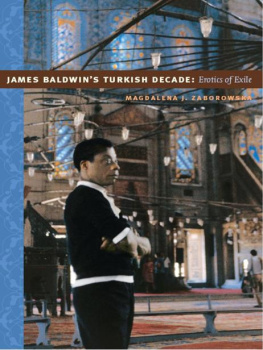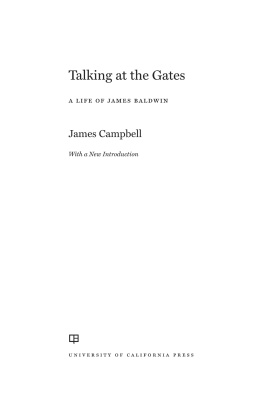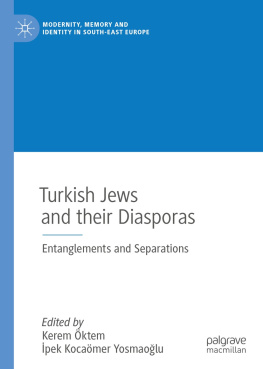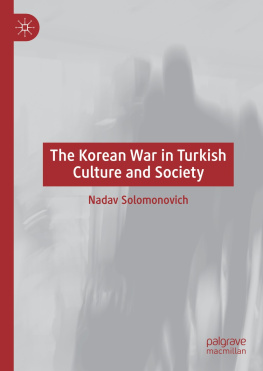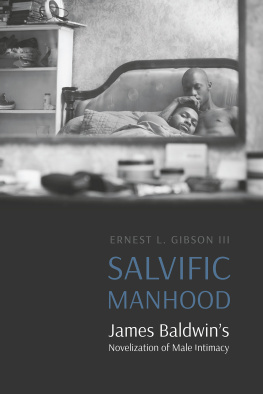MAGDALENA J. ZABOROWSKA
2009 Magdalena J. Zaborowska
Typeset in Quadraat by Tseng Information Systems, Inc.
Library of Congress Cataloging-in-Publication data appear on the last printed page of this book.
PREFACE
Sightings
It is immensely important for the person who understands to be located outside the object of his or her creative understandingin time, in space, in culture. For one cannot even really see ones own exterior and comprehend it as a whole, and no mirrors or photographs can help; our real exterior can be seen and understood only by other people, because they are located outside us in space and because they are others.
MIKHAIL BAKHTIN, Response, The Dialogic Imagination
The African American writer and activist James Baldwin (192487) was born in Harlem, thousands of miles and an ocean away from Orel, the birthplace of Mikhail Bakhtin (18951975), the Russian philosopher and literary critic who wrote the foregoing epigraph. Despite the linguistic, geographic, and cultural distances between them, Baldwin and Bakhtin explored, each in his own unique way, how the social environment shapes both the language and the consciousness of groups and individuals, and espoused cross-cultural dialogue based on the belief that the human desire for self-knowledge compels reliance on others as interpreters of our identities. Surrounded by the historical and social upheaval of the Soviet Revolution and its aftermath, Bakhtin spent some time in political exile and later withdrew from public life into linguistic and literary study. He is best known as a literary theorist and as the author of numerous works of criticism, among them The Dialogic Imagination (1975), a volume that made Bakhtins name, and that of his best-known concept, famous in the United States.
A descendant of southern black migrants to the promised land of the North, James Baldwin lived much of his adult life in France and Turkey but often returned to the United States to participate in the Civil Rights Movement, visit his family and friends, and confer with his editors and publishers. Influenced by his international sojourns, and especially the little-known one in Istanbul, he wrote novels, plays, and essays that explored Americanness as inflected by race, class, gender, sexuality, and nationhood, within and outside U.S. borders. His world-famous two-essay volume The Fire Next Time (1963) called on Whites and Blacks to dare everything to end the racial nightmare, and achieve our country, and change the history of the world (141). It virtually prophesied the riots in American cities in the late 1960s. His works resound with a powerful mix of voices, and he commands complex sentences and emotions that make his style inimitablefrom the intensely autobiographical tone of his first essay collection, Notes of a Native Son (1955), through the passionate intellectual and prophetic argument of The Fire Next Time, to the confessional narrative persona of his second novel, Giovannis Room (1956), the polyphonic storytelling consciousness of his third, Another Country (1962), and a kaleidoscopic intra- and international layering of scenes of black experience in the essay volume No Name in the Street (1972), and his last novel, Just above My Head (1979). Baldwins books and ideas influenced generations of black writers, from Alice Walker, Maya Angelou, Audre Lorde, and Toni Morrison, through Suzan Lori-Parks, Edward P. Jones, and Hilton Als, to Essex Hemphill, Melvin Dixon, and Randall Kenan.
Despite his extraordinary influence on American letters, however, Baldwins death in France in 1987 followed years of relative obscurity in the 1970s and 1980s, years during which his later works were not well received or widely read and when his name began disappearing from course syllabuses at American high schools and universities. The dimming of James Baldwins literary star coincided with Mikhail Bakhtins rise to prominence as one of the most popular international theorists embraced by literary and cultural critics in the United States. In Dale E. Petersons words, Bakhtin was an exotic and somewhat rough-hewn Soviet import (Response and Call, 761). In the 1980s and 1990s, a wide spectrum of scholars embraced Bakhtins dialogism, polyphony, and double voice, concepts that were especially suited to the study of minority, multicultural, and marginalized traditions and authors. Not surprisingly, Bakhtins ideas soon found their way into the groundbreaking works of African American critics, who explored black expressive traditions, celebrated a plurality of [gendered] voices,
Baldwin may not be a dialogic writer in the classic Bakhtinian sense, but his works lend themselves to rich dialogic interpretations. His little-known extended visits in Turkey throughout the 1960s, the subject of this book, compel a new narrative space, a new telling of his life and of his black experience, as well as new readings of his works. As a scholar trained in literary, American, and African American studies, I have embraced this project because of its interdisciplinary and dialogic appeal. As an immigrant and a feminist, I was also compelled by the intense conversations between the political and the personal that I encountered while conducting research in Turkey and while writing every page of this book.
Growing up in communist Poland, I had heard of Bakhtin long before I learned of Baldwins existence. In an instance of cross-cultural exchange, years before attempting Bakhtinian readings of James Baldwins works as an international scholar, I may have seen his face on Polish national television around 1982. That first, real or imagined, sighting of James Baldwin in an unlikely location coincided with an event at the Polish United Workers Party headquarters in my hometown of Kielce, where many high school students like myself had been herded to welcome a delegation of visiting Yemeni students earlier that day. After I returned home, I glimpsed a television program that featured African Americans, their faces vivid and moving, but their voices muted with the dispassionate voice-over of the Polish narrator. Perhaps because they resonated with my naive conceptions of race and racism at the time, the images of the African Americans on the TV screen connected in my mind with those of the students from the Peoples Democratic Republic of Yemen. We welcomed the Yemeni students and cheered for their countrys striving toward socialist progress; all of us obediently applauded the same slogans at the Party headquarters. But in reality the smiling Yemeni students seemed nearly as remote and foreign to us as the serious American black men and women on television. Perhaps to us they all seemed merely a part of the states propaganda machinejust as we must have appeared to them.

Several years later, as a student of American literature at Warsaw University, I learned that James Baldwin was an important writer when we hosted the poet Nikki Giovanni, whose conversations with him had been transcribed as

